Fund/Build/Scale
After working for years in early-stage startups and as a journalist, here are three hard truths I’ve learned: 1. Success in Silicon Valley hinges on connections, hard work and luck. 2. Startups often fail because founders lack fundamental business knowledge. 3. Real, actionable advice comes from those who’ve actually done it. There’s no such thing as “founder DNA.” If you’re willing to take on risk and invest years of your life in something that has maybe a 10% chance of paying off — less if you’re a woman or person of color — you can be a startup founder. Here’s why I founded Fund/Build/Scale: 1. To help founders make fewer mistakes. 2. To share successful strategies that can accelerate your go-to-market journey. 3. To inspire more people to see themselves as potential founders. There’s a lot of overlooked talent out there, and we are missing out. This podcast is for anyone who’s interested in learning the basic skills required to launch a startup, secure initial funding and transform an idea into a sustainable business. I’m talking to guests about everything: finding a co-founder, conducting customer discovery, recruiting early employees, developing a PLG strategy, fundraising when you’re outside a major tech hub — all of it. Interested? Subscribe to Fund/Build/Scale on all major platforms and follow the podcast on LinkedIn to get articles, excerpts, transcripts and more. Fund/Build/Scale is a production of Truth and Soul Media LLC.
Episodes
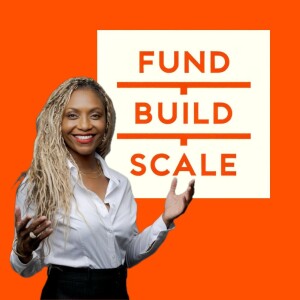
Friday May 09, 2025
Friday May 09, 2025
What makes a founder dangerous?
Not credentials. Not their pedigree. And it's not who they know.
For investor and former operator Promise Phelon, a dangerous founder is someone with lived experience, relentless conviction, and the ability to build something the world doesn't expect.
Promise is the founder and managing partner of Growth Warrior Capital, an early-stage venture firm that invests in founders building seed and Series A enterprise AI companies.
In this episode, she shares hard-won lessons from the founder’s seat and the investor’s table: how to turn capital scarcity into a strategic advantage, navigating the shift from founder to CEO, and why storytelling can’t replace traction.
We also talk about:
How to find the investors who already have reasons to believe
The “puzzle vs. mystery” framework for prioritizing execution
What a dangerous founder pitch actually sounds like
How underrepresented founders can cultivate an appetite for risk — without a safety net
If you're building in stealth, raising without a network, or just wondering how to scale yourself as your company grows, this episode will give you a framework and some momentum.
RUNTIME 59:08
EPISODE BREAKDOWN
(04:32) Promise talks about her path from operator to investor
(06:57) Inside Growth Warrior Capital’’s investment strategy
(09:25) What her typical work week looks like
(14:01) “We love the qualitative, but our goal is to get to the meat of what's going on.”
(16:36) How Promise prefers to be pitched
(18:21) Growth Warrior Capital has plans for a second fund in the works
(21:27) Why more founders need to evolve from being firestarters to fiduciaries
(25:13) Where inexperienced entrepreneurs need the most help
(28:13) “ We look for coachability in a founder. We also look for rigidity.”
(30:50) “ A dangerous founder is someone that you don't expect to come up and kick you in the teeth.”
(34:01) “ …So Kendrick Lamar is the soundtrack for every single investor meeting.”
(36:09) What it’s like to be pitched by a dangerous founder
(39:30) One myth about successful founders that’s holding people back
(44:23) How to cultivate an appetite for risk when you don’t have a safety net
(50:41) What happens when founders learn to make bold strategic moves
(53:09) ”As a founder, you're not trying to convince anyone of anything. It's a search problem.”
(57:14) Something Promise used to believe about venture capital that is just totally untrue
LINKS
Promise Phelon
Growth Warrior Capital
Almanack of Naval Ravikant
SUBSCRIBE
📥 LinkedIn: https://www.linkedin.com/newsletters/7249143254363856897/
📸 Instagram: https://www.instagram.com/fundbuildscale/
Thanks for listening!
– Walter.
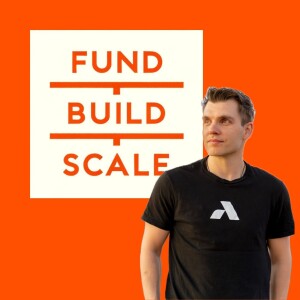
Wednesday May 07, 2025
Wednesday May 07, 2025
What kind of founder spends five years building a product before going to market?
One who's trying to solve a very hard problem.
Vince Gaydarzhiev is the founder of Alcatraz, a deep tech startup that uses facial authentication. The platform isn’t used to lock people out of single offices or consumer gadgets; its customers are buying global enterprise security, where compliance is strict, trust is earned, and failure isn't an option.
In this episode, Vince shares the emotional, strategic, and technical realities of building a company at the intersection of AI, hardware, and enterprise infrastructure. From working nights on prototypes with a tiny team to navigating founder isolation and breaking into risk-averse markets with no Silicon Valley network, Vince takes us inside the long game of building something real.
We cover:
Why it took three years to get a product into customer hands — and two more to scale it
Validating a deep tech startup when you're not an insider
What enterprise security leaders really care about (and how not to sell to them)
Why founder empathy and “becoming your customer” are non-negotiable in this space
The hiring philosophy that helped Alcatraz scale with high-agency, low-ego team members
How Vince de-risked himself to earn trust from investors and prospective hires
If you're building something technically ambitious or thinking about launching a startup in AI, hardware, or security, listen in.
RUNTIME 32:15
EPISODE BREAKDOWN
(2:35) Where the idea for Alcatraz came from and why Vince decided to take the leap
(5:51) His process for validating the concept with investors, customers, and security teams
(9:37) “I was surprised that this thing didn't exist yet.”
(11:48) Why it took five years to develop a “globally scalable” minimum viable product
(13:29) How much has his TAM estimate changed since entering the market?
(17:55) The pitch Vince used to recruit employees away from Apple and other top companies
(20:05) “ In 2016, investors were investing into companies purely on a deck.”
(22:18) “ I had zero network. It was my first time.”
(24:42) “ Many people mentally cannot take ‘nos’ in bulk. They get depressed, they feel it's personal.”
(26:50) Why the name “Alcatraz?”
(28:12) “ It's really tough to work with people that you don't like. Very tough. It's never gonna work out.”
(30:24) The one question Vince would have to ask the CEO if he were interviewing at an early-stage startup
LINKS
Vince Gardarzhiev
Alcatraz
Alcatraz AI Raises $6.1M in Funding for Frictionless Access Control, 4/27/2021, press release
Alcatraz AI Receives $25M Series A Funding to Accelerate International Growth, 9/13/2022, press release
SUBSCRIBE
📥 LinkedIn: https://www.linkedin.com/newsletters/7249143254363856897/
📸 Instagram: https://www.instagram.com/fundbuildscale/
Thanks for listening!
– Walter.
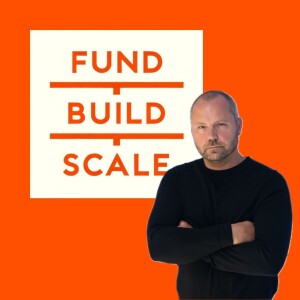
Tuesday May 06, 2025
Tuesday May 06, 2025
What turns a free trial user into a paying customer?
For Ola Sars, founder and CEO of Soundtrack, the answer is all about behavior. In this episode, we break down how his team uses product-led growth (PLG) and product-qualified leads (PQLs) to drive conversions.
You'll hear how playing 100 tracks became a key signal for purchase intent, the tactics Soundtrack deploys to help self-serve customers experience value fast, and what it takes to scale a SaaS business in a market ruled by consumer giants.
If you're building a PLG motion or trying to convert lookie-loos into cash customers, listen in.
RUNTIME 45:20
EPISODE BREAKDOWN
(3:11) “ It's 20 years now I've been trying to make a living here in the intersection of audio, music and technology.”
(5:22) How Ola became a member of Beats’ founding team.
(9:37) Why he returned to Stockholm to build Soundtrack instead of remaining stateside.
(13:38) When Ola started to learn about product-led growth.
(15:38) “ It's a $40-50 billion market on an annual basis. And we're kind of the only company going after that market right now.”
(18:54) “ We had this approach that everything had to be done self-serve.”
(20:33) Creating a framework to ID and leverage product-qualfied leads (PQLs).
(26:06) What role will AI play in music distribution and production?
(28:23) The gaps Ola sees in today’s music technology marketplace.
(32:04) Why AI-generated music “ doesn't make any sense.”
(35:03) Ola reflects on several cultural shifts that have made it “much easier now” to build in Europe.
(38:12) Stockholm’s entrepreneurs are “kind of hybrid Americans in a way how we think about business.”
(42:08) The biggest myth Americans believe about starting up in Europe.
(44:09) If you were interviewing for a job with an early-stage startup, what’s one question you’d have to ask the CEO before you could accept an offer?
LINKS
Ola Sars
Soundtrack
B2B music streaming service Soundtrack Your Brand raises $15 million, Tech.eu
What is “lagom?”, Study in Sweden
The English term "mid" matches the Swedish term "bland, mellan,” tok-pisin.com
SUBSCRIBE
📥 LinkedIn: https://www.linkedin.com/newsletters/7249143254363856897/
📸 Instagram: https://www.instagram.com/fundbuildscale/
Thanks for listening!
– Walter.
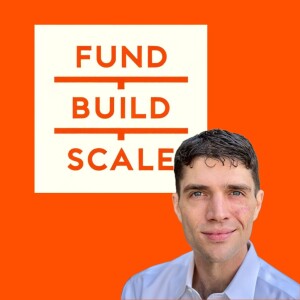
Friday Apr 18, 2025
Friday Apr 18, 2025
Mike Conover started his career as a machine learning engineer. Today, he’s the co-founder and CEO of Brightwave, an AI startup helping financial professionals make faster decisions with massive, unstructured data.
In this episode of Fund/Build/Scale, Mike shares how he made the leap from technical contributor to strategic leader—and the hard lessons he learned along the way.
From translating technical vision into a focused go-to-market strategy, to learning how to coach, hire, and scale intentionally, Mike unpacks the mindset shift required to move from building code to building a company.
We also get into:
How Brightwave validates new product bets in a high-stakes industry
Why founder-market fit is emotional, not just strategic
Mistakes to avoid when hiring your early team
How to create focus loops and feedback channels before feature creep sets in
Why emotional intelligence and execution velocity matter just as much as AI architecture
If you're a technical founder — or thinking about becoming one — this conversation offers an unvarnished look at what it actually takes to scale yourself while scaling your startup.
RUNTIME 55:09
EPISODE BREAKDOWN
(1:12) Mike explains how Brightwave works.
(3:49) Where the idea came from.
(7:47) How he connected with co-founder Brandon Kotara.
(10:58) The biggest challenges he faced shifting from an engineering role to founder/CEO.
(14:22) “As a CEO, you have to do a lot of jobs that you have no preparation for.”
(15:07) Working with a coach has been “such a sustaining source of inspiration, but also continuity.”
(18:45) “There's a rap lyric I really like, which is, ‘you can't crush me, I'm dirt.’”
(20:29) Turning “reasonable” feature requests into new products helped Brightwave build customer trust.
(25:30) “ It's unusual,” but co-pilots and POC programs were not part of their early success.
(30:12) Tips for building feedback loops between customers and the product team.
(36:04) Seed to Series A “ was about four months.”
(40:02) “ Most startups are not that defensible.”
(45:54) “A lot of the product-led growth techniques that you might use don't always fit the market especially well.”
(47:45) How to create a self-assessment framework for founder-market fit.
(50:43) “ Brightwave — in its full totality — has material substance in my mind already.”
(53:05) The one question he'd have to ask the CEO before taking a startup job.
LINKS
Mike Conover
Brandon Kotara
Brightwave
Fred Kofman, Conscious Business
SUBSCRIBE
📥 LinkedIn: https://www.linkedin.com/newsletters/7249143254363856897/
📸 Instagram: https://www.instagram.com/fundbuildscale/
Thanks for listening!
– Walter.
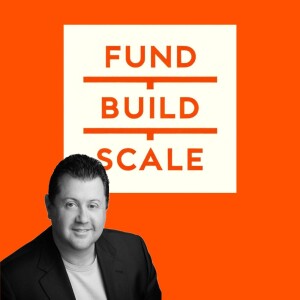
Friday Apr 11, 2025
Friday Apr 11, 2025
Igor Taber has sat on both sides of the table: first as a VC at Intel Capital, then as an operator at high-growth AI startup DataRobot. Now, as co-founder of Cortical Ventures, he’s backing the next generation of AI-first startups.
In this episode, Igor shares how his operating experience reshaped his investment lens, what most VCs still miss about early-stage execution, and how founders can break through the AI noise to build something that actually lasts.
We also get into:
What it really takes to build conviction at the seed stage
How Cortical Ventures defines “defensibility” in AI
The questions every founder should ask an investor (but usually doesn’t)
Why your biggest advantage may not be your model — it’s your momentum
If you’re building in AI, fundraising, or trying to turn early traction into a long-term advantage, download this episode.
RUNTIME: 39:52
EPISODE BREAKDOWN
(1:19) Igor: My investor-operator-investor path was “ a really interesting progression.”
(3:33) Previously, a lot of his opinions were rooted in the “VC echo chamber.”
(6:56) “ You just try to do your best to be a good partner and be helpful.”
(7:43) Why he and co-founder Jeremy Achin started Cortico.
(13:39) What makes an early-stage AI team stand out?
(17:15) When it comes to solo vs. team, “ we haven't seen any like material difference in outcome.”
(18:56) “ I think the biggest company on LinkedIn is called ‘Stealth.’”
(22:17) Why TAM isn’t a major consideration when evaluating new opportunities.
(24:18) His framework for evaluating and validating seed-stage startups.
(26:03) The biggest red flags in founder discovery meetings.
(28:21) Top mistakes founders make in the first year after closing a seed round.
(33:16) How Cortical advises AI founders to build more resilient companies.
(35:55) A few things to keep in mind before quitting a secure job to launch a startup.
(38:07) How to make yourself more investible in 2025.
LINKS
Igor Tabor
Jeremy Achin
Cortical Ventures
SUBSCRIBE
📥 LinkedIn: https://www.linkedin.com/newsletters/7249143254363856897/
📸 Instagram: https://www.instagram.com/fundbuildscale/
Thanks for listening!
– Walter.
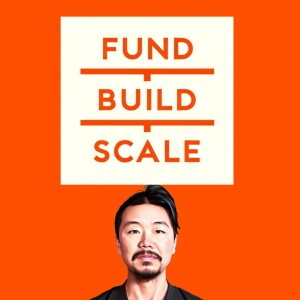
Friday Apr 11, 2025
Friday Apr 11, 2025
Runway CEO and co-founder Siqi Chen shares how his team used a waitlist not just to build hype, but to engineer smarter growth.
In this episode of Fund/Build/Scale, Siqi breaks down how Runway strategically kept customers in a holding pattern to gather feedback, qualify demand, and refine product-market fit.
We also talk about:
How to build trust with early users through transparency
Using scarcity and access control as GTM levers
Why financial planning should be accessible to everyone on the team
What most founders get wrong about burn rate and cash flow
Whether you're in the early stages or prepping for launch, this episode offers a masterclass in thoughtful, tactical go-to-market execution.
RUNTIME 39:46
EPISODE BREAKDOWN
(2:49) “ What if somebody worked on a Figma for finance?”
(5:48) “ You have to understand what are the different levers of the machine, and how the machine works.”
(8:50) Why Runway represents a cultural shift in corporate transparency.
(11:51) How much financial literacy should founders try to foster across their organizations?
(14:48) How much runway should a startup aim for?
(18:39) How Runway’s waitlist fed directly into its GTM strategy.
(21:36) The ”very simple motivation” behind creating the waitlist.
(24:35) The “negging trick” that makes sales prospects want to buy your product.
(26:37) “ Your early customers join you for very different and specific reasons.”
(28:55) “ Our first website, we didn't even really talk about the product.”
(30:23) After opening up the waitlist, “ nothing really changed — we were doing outbound sales already.”
(34:17) “People who are really motivated by your purpose and mission are willing to give you a lot more leeway.”
(36:42) What the next five years could look like for Runway.
(38:07) The one question Siqi would ask a CEO if he was interviewing at an early-stage startup.
LINKS
Siqi Chen
Runway
Runway lands $27.5M to streamline financial planning for businesses
As Not Seen on TV, Pete Wells, NYT Restaurant Review, 11/13/12
SUBSCRIBE
📥 LinkedIn: https://www.linkedin.com/newsletters/7249143254363856897/
📸 Instagram: https://www.instagram.com/fundbuildscale/
Thanks for listening!
– Walter.
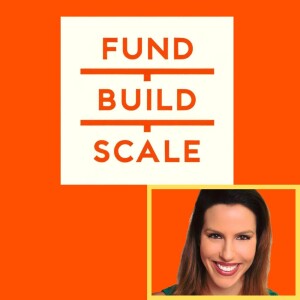
Thursday Apr 03, 2025
Thursday Apr 03, 2025
Ayelet Noff has spent more than two decades helping startups land meaningful press — but she’s also seen how the game has changed.
In this episode of Fund/Build/Scale, the founder of SlicedBrand and new PR tech startup Dazzle shares what still works, what doesn’t, and how founders can earn meaningful attention in today’s fractured media landscape.
We get into:
– What makes a pitch actually land with reporters– How to build credibility before you have traction– The biggest mistakes founders make when trying to “get press”– How AI tools are shaping the future of PR
Whether you’re early-stage or scaling, this episode is packed with practical advice for telling your story with clarity and credibility.
RUNTIME 49:49
LINKS
Ayelet Noff
@AyeletNoff (X)
SlicedBrand
Dazzle
SUBSCRIBE
📥 LinkedIn: https://www.linkedin.com/newsletters/7249143254363856897/
📸 Instagram: https://www.instagram.com/fundbuildscale/
Thanks for listening!
– Walter.
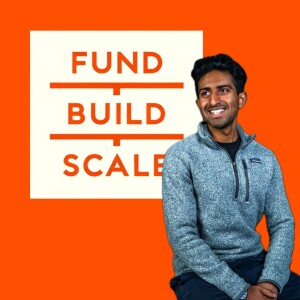
Tuesday Apr 01, 2025
Tuesday Apr 01, 2025
Sahitya Senapathy, founder and CEO of Endeavor AI, joins Fund/Build/Scale to talk about launching a solo-founded startup at the intersection of AI and heavy industry.
From building FEMA apps at age 11 to raising $7M before finishing college, Sahitya shares the hard lessons behind the headline.
We dig into:
– Selling AI solutions to manufacturers with no network and no co-founder– What enterprise customers actually care about in early-stage tech– Navigating credibility as a first-time founder in hard tech– Building while still learning — on the floor, in the pitch, as a leader
This is a candid look at what it means to hustle in deep tech without shortcuts or safety nets.
RUNTIME 46:18
EPISODE BREAKDOWN
(2:25) How Sahitya’s parents gave him early exposure to manufacturing logistics and culture
(5:42) How working on resilience tech during natural disasters sparked his focus on real-world impact
(8:16) Lessons from Palantir and how the forward-deployed model shaped his customer-first mindset
(9:46) His two-month immersion on the shop floor of a steel factory
(12:05) Why forward deployment contradicts traditional product development models
(15:44) Building a network in legacy industries through conferences, mentorship, and cold outreach
(18:03) How strong references and early pilots drove initial traction
(21:34) “ Starting a company is an extremely hard leap for many people to make. And it just so happened that I almost accumulated all these skills over my life.”
(22:48) Hiring philosophy: high-agency, under-the-radar talent and long-term team-building
(24:39) How he de-risks himself for both investors and potential hires
(28:55) Learning to hire and manage people with more experience than you
(30:20) Why a rejected engineering candidate became Endeavor’s first full-time sales hire
(32:06) The toughest sales objection he’s had to overcome
(34:02) “ You cannot do the forward deploy model without personas.”
(36:11) “ I believe truly at the core that I have unlimited potential, and to that end, there's no point in ever believing that I could be limited by something.”
(38:23) “ The biggest risk you can take is not taking a risk, especially in this day and age.”
(40:43) How to validate your idea before leaving your job or taking a major leap
(44:42) One question he’d ask a CEO before joining an early-stage AI startup
LINKS
Sahitya Senapathy
Endeavor AI
Forward deployment model
SUBSCRIBE
📥 LinkedIn: https://www.linkedin.com/newsletters/7249143254363856897/
📸 Instagram: https://www.instagram.com/fundbuildscale/
Thanks for listening!
– Walter.
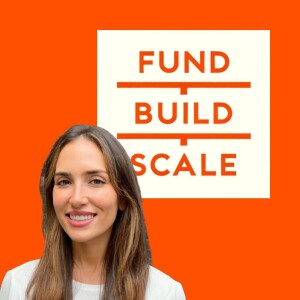
Thursday Mar 27, 2025
Thursday Mar 27, 2025
Sophie Bakalar, partner at Collaborative Fund, joins Fund/Build/Scale for a candid conversation about early-stage investing in climate tech, consumer AI, and deep tech hardware. She shares how she evaluates “green” founders with limited experience, what kind of traction she looks for in pre-revenue companies, and why a passion for solving a real-world problem outweighs having a stacked resume.
We also cover:
Tactical funding strategies for capital-intensive startups
The value of adaptable teams and fractional CFOs
How to avoid overspending before product-market fit
The mindset shifts needed before approaching VCs
This episode is packed with advice for founders navigating long development timelines, technical risk, and early go-to-market strategy — especially if you’re looking to raise money while keeping burn low and momentum high.
RUNTIME 48:59
EPISODE BREAKDOWN
(2:24) “Like a lot of people in venture, I have sort of a windy path.”
(6:47) Inside Collaborative Fund: “We all roll up our sleeves on everything here.”
(7:55) Which industries and founder profiles Sophie is watching in 2025.
(10:37) Where consumer AI hardware may be headed.
(12:03) What her typical work week looks like.
(15:05) In a people-driven industry, inexperienced founders need to de-risk themselves before doing investor outreach.
(17:37) “We don't necessarily create a hard line or a clear box around what makes a climate tech investment.”
(22:43) “There are a few things that investors in climate and energy tech are looking for.”
(26:23) When it comes to solo founders, “expectations from funders [are] a little bit higher.”
(28:28) What excites Sophie about working with first-time founders.
(30:17) The most common reason why a team with a strong idea fails to execute.
(33:31) Why a founder’s “adaptability quotient” is so critical to their success.
(36:53) Personalities (and business models) that should avoid venture capital.
(40:16) “I hope I've managed to retain a good amount of empathy.”
(42:11) One piece of advice for VCs she returns to frequently.
(44:37) “The only real seismic changes are going to happen when you start to see more female entrepreneurs build really successful companies.”
(46:52) The blogger you need to read “before you kick off your fundraise.”
(47:39) The one question Sophie would have to ask a CEO before accepting an offer from an early-stage startup.
LINKS
Sophie Bakalar
Craig Shapiro
Collaborative Fund
Fred Wilson, AVC archive
SUBSCRIBE
📥 LinkedIn: https://www.linkedin.com/newsletters/7249143254363856897/
📸 Instagram: https://www.instagram.com/fundbuildscale/
Thanks for listening!
– Walter.
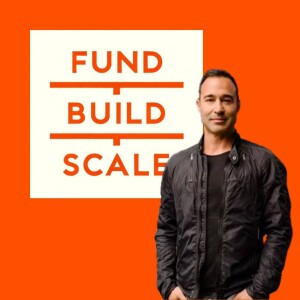
Thursday Mar 27, 2025
Thursday Mar 27, 2025
Recorded in July 2024, Aimi founder Edward Balassanian joins Fund/Build/Scale to share how his AI-powered platform creates generative, copyright-safe music for enterprise clients. He explains how customer discovery with DJs shaped Aimi’s tech, why compliance is core to their strategy, and why the company downsized after hitting product-market fit — all while inventing a market where AI music solves problems humans can’t.
RUNTIME 30:47
EPISODE BREAKDOWN
(4:17) “ I consider myself a platform person. I build operating systems.”
(7:39) “ It's incumbent on a founder in a space like this to be well-versed in not only the art of the music, but the science of the music as well.”
(9:14) “ We see a song as a medium between fans and artists. We're not in the song business.”
(11:03) How Aimi is building a library of licensed content: “We’ve been pretty methodical.”
(14:59) “ We see ourselves as kind of uniquely in the business of music AI for creation, not for imitation.”
(16:46) “ We de-risk the use of music. That's one of the biggest selling points for enterprise customers.”
(18:44) “ Like most tech people, I would say we're always going to be in beta.”
(21:58) Why Aimi raised its $20M Series B in 2021.
(24:01) Downsizing after reaching PMF “ was the best decision that we that we could have made.”
(28:05) “ I think what's really interesting is building platforms, and any platform today is going to have to incorporate AI into it.”
LINKS
Edward Balassanian (Crunchbase)
Aimi
AI-Powered Music Platform Aimi has raised $20 million in a Series B round of funding
SUBSCRIBE
📥 LinkedIn: https://www.linkedin.com/newsletters/7249143254363856897/
📸 Instagram: https://www.instagram.com/fundbuildscale/
Thanks for listening!
– Walter.

How to take an AI startup from idea to reality
The first episode of Fund/Build/Scale will be available in February 2024.
For transcripts, show updates and other exclusive content, follow “Fund/Build/Scale” on:
- Substack: https://fundbuildscale.substack.com
- LinkedIn: https://www.linkedin.com/groups/14341226
- YouTube: https://youtube.com/@FBSpodcast
- Eventbrite: http://fundbuildscale.eventbrite.com







